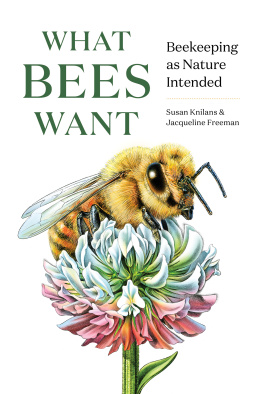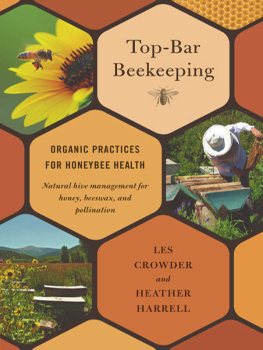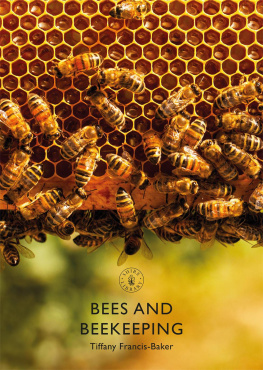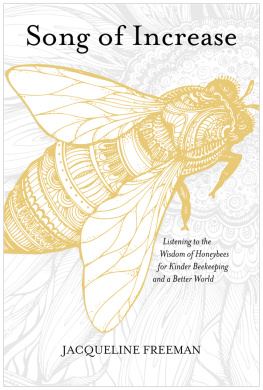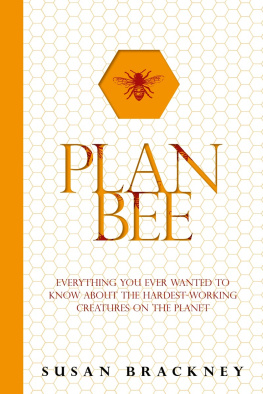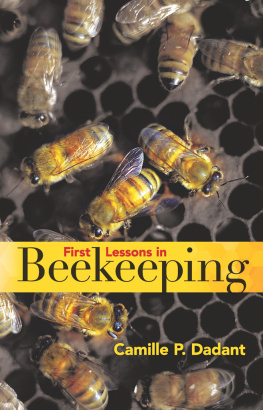Contents
Guide

WHAT BEES WANT
Beekeeping as Nature Intended

Susan Knilans
Jacqueline Freeman

The Countryman Press
An Imprint of W. W. Norton & Company
Independent Publishers Since 1923
This book is intended as a general information resource about preservation beekeeping. Please read the entire book carefully before undertaking any of the activities it describes. Please keep in mind that bees are venomous insects. To keep yourself safe, you must know how to read their mood. If they are hot, they are telling you to leave them alone, and you should do so. Using a ladder to catch a swarm is very risky. If you cannot handle a particular swarm without using a ladder, let it go. If you are allergic to bee stings, never go anywhere near bees without an EpiPen or other epinephrine auto-injector.
Any URLs displayed in this book link or refer to websites that existed as of press time. The publisher is not responsible for, and should not be deemed to endorse or recommend, any website other than its own or any content that it did not create. The authors, also, are not responsible for any third-party material .
Copyright 2022 by Susa n Knilans and Jacqueline Freeman
Illustrations copyright 2022 by Jacqueline Freeman
Foreword copyright 2022 by Torben Schiffer
The True Price of Honey by Torben Schiffer, reprinted by permission of Torben Schiffer.
Text of Darwinian Beekeeping provided by Thomas D. Seeley.
All rights reserved
For information about permission to reproduce selections from this book, write to Permissions, The Countryman Press, 500 Fifth Avenue, New York, NY 10110
For information about special discounts for bulk purchases, please contact W. W. Norton Special Sales at specialsales@wwnorton.com or 800-233-4830
Book design by Chrissy Kurpeski
Production manager: Devon Zahn
The Library of Congress has cataloged the printed edition as follows:
Names: Knilans, Susan, author. | Freeman, Jacqueline, author.
Title: What bees want : beekeeping as nature intended / Susan Knilans, Jacqueline Freeman
Other titles: Beekeeping as nature intended
Description: New York, NY : The Countryman Press, [2022] | Includes index.
Identifiers: LCCN 2021049590 | ISBN 9781682686737 (cloth) | ISBN 9781682686744 (epub)
Subjects: LCSH: Bee culture. | Handbooks and manuals.
Classification: LCC SF523 .K58 2022 | DDC 638/.1dc23/eng/20211028
LC record available at https://lccn.loc.gov/2021049590
The Countryman Press
www.countrymanpress.com
A division of W. W. Norton & Company, Inc.
500 Fifth Avenue, New York, NY 10110
www.wwnorton.com
Bees are of an entirely different order. Their journey is not the same as ours.
MICHAEL JOSHIN THIELE

It is apparent to me that modern beekeeping will eventually tear the species of honeybees into its demise, if no other counter movement will arise. Not because beekeepers are vicious or ill minded but because the majority does not understand the effects of their manipulations as a whole.
TORBEN SCHIFFER

The word dominion in Genesis is often interpreted as divine sanction for all forms of animal abuse. But the original meaning of the word dominion comes from the Hebrew verb yorade , which means to come down to, to have communion with and compassion for.
DR. MICHAEL W. FOX
This book is for my husband, who has helped me gather swarms and carry hives, and who has come to love the bees as deeply as I.
A special dedication also to Torben Schiffer and Tom Seeley, for generously sharing their research with us. You bring the science to our methods, and give voice to the wildness of bees.
SUSAN KNILANS
For my dear mother, Jesse Carole Stone, who, from the beginning, encouraged me to explore and love the land, identify the floral bounty and native wildlife, gather and cook field-foraged weeds, climb a hundred trees, draw and paint my visions, and to have the courage to be who I have become. It really was okay with her that we once had 32 cats.
JACQUELINE FREEMAN
Contents

PART 1
The Journey to Preservation Beekeeping
PART 2
Preservation Beekeeping: Healthy Bees and a Kinder World

Torben Schiffer, Dipl. Biol.
I have been keeping bees since 2004. In my early years, I learned the concepts and practices of conventional beekeeping. But each successive year, I learn more about a different path, one that shows me the bees delicate relationship with nature. To free my bees, I first had to free myself from conventional beekeeping.
A few years ago, my bee education and appreciation took a big leap as I began to understand how in many ways humans have thwarted natural bee behavior. I was taking a walk down the tree-lined dirt path from my house to the organic forest plantation a few minutes away. The sun shone through uncountable gaps between the branches and leaves of the old apple trees. Deep in thought, I suddenly heard a swarm. Thousands of bees flew high in the sky, a dense cloud of buzzing honeybees about 20 meters above my head.
The bees headed across my neighbors yard, heading in the direction of my own home. I ran across my neighbors property, chasing the bees. When the swarm reached the giant spruce tree in front of my house, the bees took a sudden right and headed directly to my backyard. I ran toward my house andfor the very first timewitnessed approximately 20,000 bees swarming to the balcony above my porch.
The summer prior to this, I had placed three simulated tree cavities (which I call SchifferTrees) on the balcony outside my research office, where I could easily watch the bees come and go. Two of the SchifferTrees had remained empty as I waited for local bees to find them. Now, new life was about to move in.
I ran into the house, grabbed my camera and flew up the stairs as thousands of bees arrived at their chosen hive and soared everywhere around it. I stepped outside the balcony door and was enveloped by the buzzing cloud of thousands of bees. I became a part of them. Every fiber of my being connected to an indescribable force of nature. I felt the bees collective agreement and single-minded determination to move into their new home.
My neurons felt charged with the electricity of the moment. The freedom of these bees had been a long time coming. I had intentionally purchased the colony from a conventional beekeeper as part of a rewilding project I was working on, and this swarm had come out of one of the boxes I placed on the forest plantation a few weeks earlier.
These colonies had been kept under the rules of modern conventional beekeeping, which means they were never allowed to express their natural behavior. With their previous owner, the bees lived in flimsy wooden hives and served solely as livestock who produced honey. Now, never again would they have to live in these unnatural conditions. Witnessing all the colonys evolutionary abilities and natural behaviors playing out for the first time was electrifying and filled my heart with happiness. I experienced such a sense of relief and contentment. This was, for me, a truly overwhelming and spiritual event.

